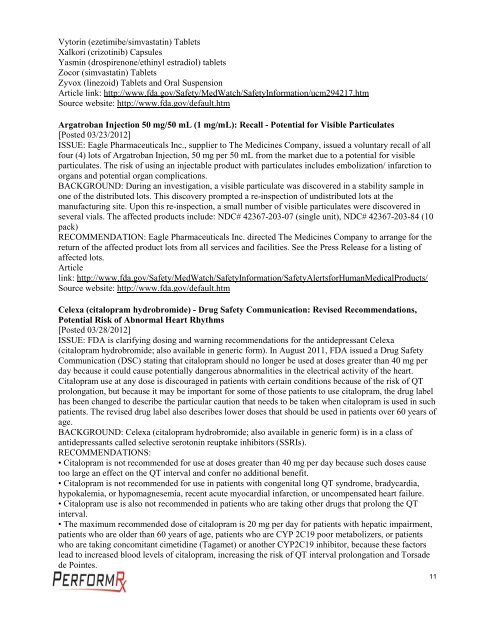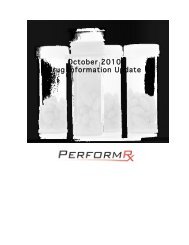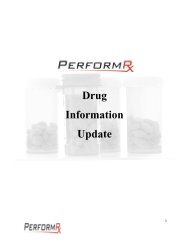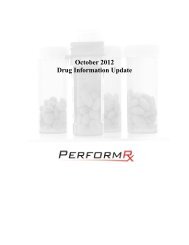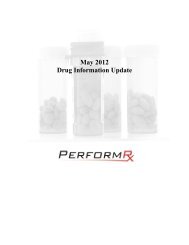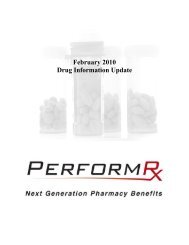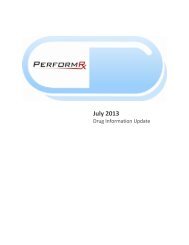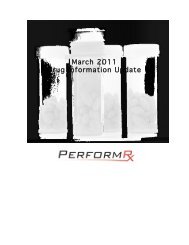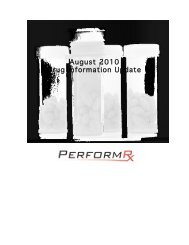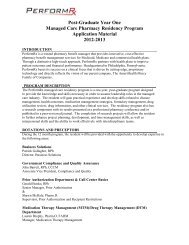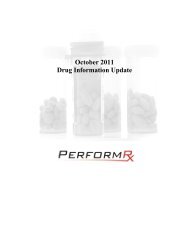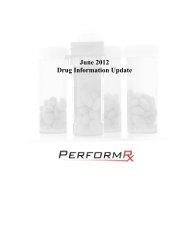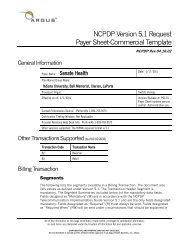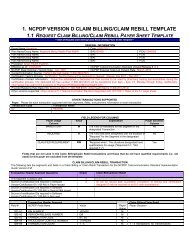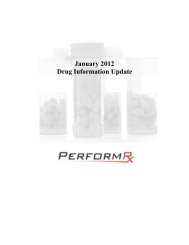April 2012 Drug Information Update - Pharmacy Benefits ...
April 2012 Drug Information Update - Pharmacy Benefits ...
April 2012 Drug Information Update - Pharmacy Benefits ...
You also want an ePaper? Increase the reach of your titles
YUMPU automatically turns print PDFs into web optimized ePapers that Google loves.
Vytorin (ezetimibe/simvastatin) Tablets<br />
Xalkori (crizotinib) Capsules<br />
Yasmin (drospirenone/ethinyl estradiol) tablets<br />
Zocor (simvastatin) Tablets<br />
Zyvox (linezoid) Tablets and Oral Suspension<br />
Article link: http://www.fda.gov/Safety/MedWatch/Safety<strong>Information</strong>/ucm294217.htm<br />
Source website: http://www.fda.gov/default.htm<br />
Argatroban Injection 50 mg/50 mL (1 mg/mL): Recall - Potential for Visible Particulates<br />
[Posted 03/23/<strong>2012</strong>]<br />
ISSUE: Eagle Pharmaceuticals Inc., supplier to The Medicines Company, issued a voluntary recall of all<br />
four (4) lots of Argatroban Injection, 50 mg per 50 mL from the market due to a potential for visible<br />
particulates. The risk of using an injectable product with particulates includes embolization/ infarction to<br />
organs and potential organ complications.<br />
BACKGROUND: During an investigation, a visible particulate was discovered in a stability sample in<br />
one of the distributed lots. This discovery prompted a re-inspection of undistributed lots at the<br />
manufacturing site. Upon this re-inspection, a small number of visible particulates were discovered in<br />
several vials. The affected products include: NDC# 42367-203-07 (single unit), NDC# 42367-203-84 (10<br />
pack)<br />
RECOMMENDATION: Eagle Pharmaceuticals Inc. directed The Medicines Company to arrange for the<br />
return of the affected product lots from all services and facilities. See the Press Release for a listing of<br />
affected lots.<br />
Article<br />
link: http://www.fda.gov/Safety/MedWatch/Safety<strong>Information</strong>/SafetyAlertsforHumanMedicalProducts/<br />
Source website: http://www.fda.gov/default.htm<br />
Celexa (citalopram hydrobromide) - <strong>Drug</strong> Safety Communication: Revised Recommendations,<br />
Potential Risk of Abnormal Heart Rhythms<br />
[Posted 03/28/<strong>2012</strong>]<br />
ISSUE: FDA is clarifying dosing and warning recommendations for the antidepressant Celexa<br />
(citalopram hydrobromide; also available in generic form). In August 2011, FDA issued a <strong>Drug</strong> Safety<br />
Communication (DSC) stating that citalopram should no longer be used at doses greater than 40 mg per<br />
day because it could cause potentially dangerous abnormalities in the electrical activity of the heart.<br />
Citalopram use at any dose is discouraged in patients with certain conditions because of the risk of QT<br />
prolongation, but because it may be important for some of those patients to use citalopram, the drug label<br />
has been changed to describe the particular caution that needs to be taken when citalopram is used in such<br />
patients. The revised drug label also describes lower doses that should be used in patients over 60 years of<br />
age.<br />
BACKGROUND: Celexa (citalopram hydrobromide; also available in generic form) is in a class of<br />
antidepressants called selective serotonin reuptake inhibitors (SSRIs).<br />
RECOMMENDATIONS:<br />
• Citalopram is not recommended for use at doses greater than 40 mg per day because such doses cause<br />
too large an effect on the QT interval and confer no additional benefit.<br />
• Citalopram is not recommended for use in patients with congenital long QT syndrome, bradycardia,<br />
hypokalemia, or hypomagnesemia, recent acute myocardial infarction, or uncompensated heart failure.<br />
• Citalopram use is also not recommended in patients who are taking other drugs that prolong the QT<br />
interval.<br />
• The maximum recommended dose of citalopram is 20 mg per day for patients with hepatic impairment,<br />
patients who are older than 60 years of age, patients who are CYP 2C19 poor metabolizers, or patients<br />
who are taking concomitant cimetidine (Tagamet) or another CYP2C19 inhibitor, because these factors<br />
lead to increased blood levels of citalopram, increasing the risk of QT interval prolongation and Torsade<br />
de Pointes.<br />
11


